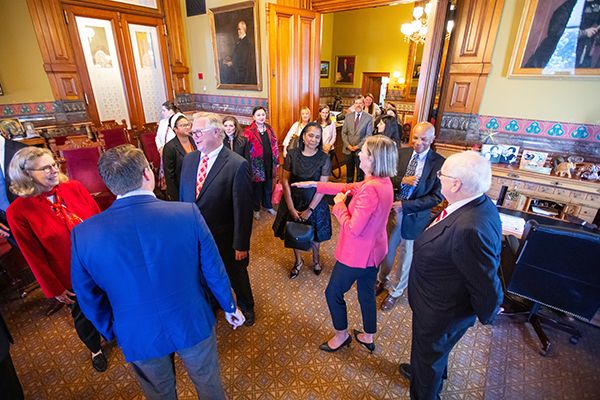Meeting virtually June 20, the state Board of Regents announced a proposed 4.25% tuition increase for undergraduate and graduate students at Iowa State this fall. Excluding differential tuitions, that translates to a:
- $354 annual tuition increase for resident undergraduates, to $8,678
- $1,026 increase for nonresident undergraduates, to $25,162
- $432 increase for resident graduate students, to $10,572
- $1,092 increase for nonresident graduates, to $26,776
As proposed, tuition for professional veterinary medicine students would go up 5% ($1,258) for residents and 3.5% ($1,938) for nonresidents.
The board is expected to approve 2022-23 tuition and mandatory student fee rates at its July 27 meeting.
Differential rates aligned in two groups
With a final differential tuition increase this fall for sophomore students in engineering, ag systems technology and industrial technology majors, Iowa State would conclude a multi-year effort to simplify dozens of differential tuition rates into two categories. For resident undergraduates this fall, the two differentials are $1,794 and $2,928.
The regents approved the first differential tuition requests at Iowa State for the 2006-07 school year to cover higher costs of instruction. More requests followed in subsequent years. In June 2018, Iowa State proposed its two-tier differential tuition structure. With the exception of sophomores in engineering, ag systems technology and industrial technology, that alignment was completed in the 2021-22 academic year.
Iowa State is proposing to remove the tuition differential ($2,486) for its master of real estate development to help grow enrollment in the program. The change is based on internal market research and feedback from current and prospective students.
Mandatory fee increases
As proposed, the mandatory student fee package would increase $145 (11%), to $1,455, primarily to support the increased costs of providing services to students. The increase is derived from increases of $70 to the technology fee, $24 to the health fee, $21 to the student services fee (for CyRide operations), and $30 to the recreation fee.
Student leader comments
As part of the annual tuition-setting discussion, the regents receive comments from student leaders on the three university campuses. Student government president Jacob Ludwig and Rachel Sorensen, incoming president of ISU's graduate and professional student senate, agreed the 2022 Iowa Legislature left the regents "in a tough position," as Sorensen termed it.
"Less-than-desirable appropriations from the state make it impossible to maintain the current rate of tuition and the high level of academic quality at our institutions," Ludwig said. "Though a tuition raise is regrettable, I know the board does not make this decision lightly or with malice."
Noting that tuition has climbed steadily since 2000, "support from the state has pretty much stagnated. Acquiring additional funds has been an uphill battle that is harder to win with each passing year," he said.
He pledged Iowa State student support during the next legislative cycle to make the case for better state funding of public higher education.
Regents' tuition guardrails
In November 2018, with the goal of making education costs more predictable for students and families, the board approved a five-year plan that ties the size of tuition increases for resident undergraduates directly to state funding increases. The "guardrails," as board president Michael Richards termed them, apply to Iowa State and the University of Iowa.
- If the Iowa Legislature fully funds the schools' appropriation requests, the base resident undergraduate tuition would increase 3 percent in the fall.
- If state funding remains unchanged for the next fiscal year, resident undergraduate tuition would increase 3 percent plus the projected HEPI (Higher Education Price Index). According to economists in Iowa's Tippie College of Business, the HEPI projected midpoint for FY23 is 3.7%.
- If the Legislature partially funds the universities' funding requests (this year's scenario), resident undergraduate tuition would be set somewhere in between. According to the agenda document, the proposed increase for this fall could have been as high as 5.6%.

